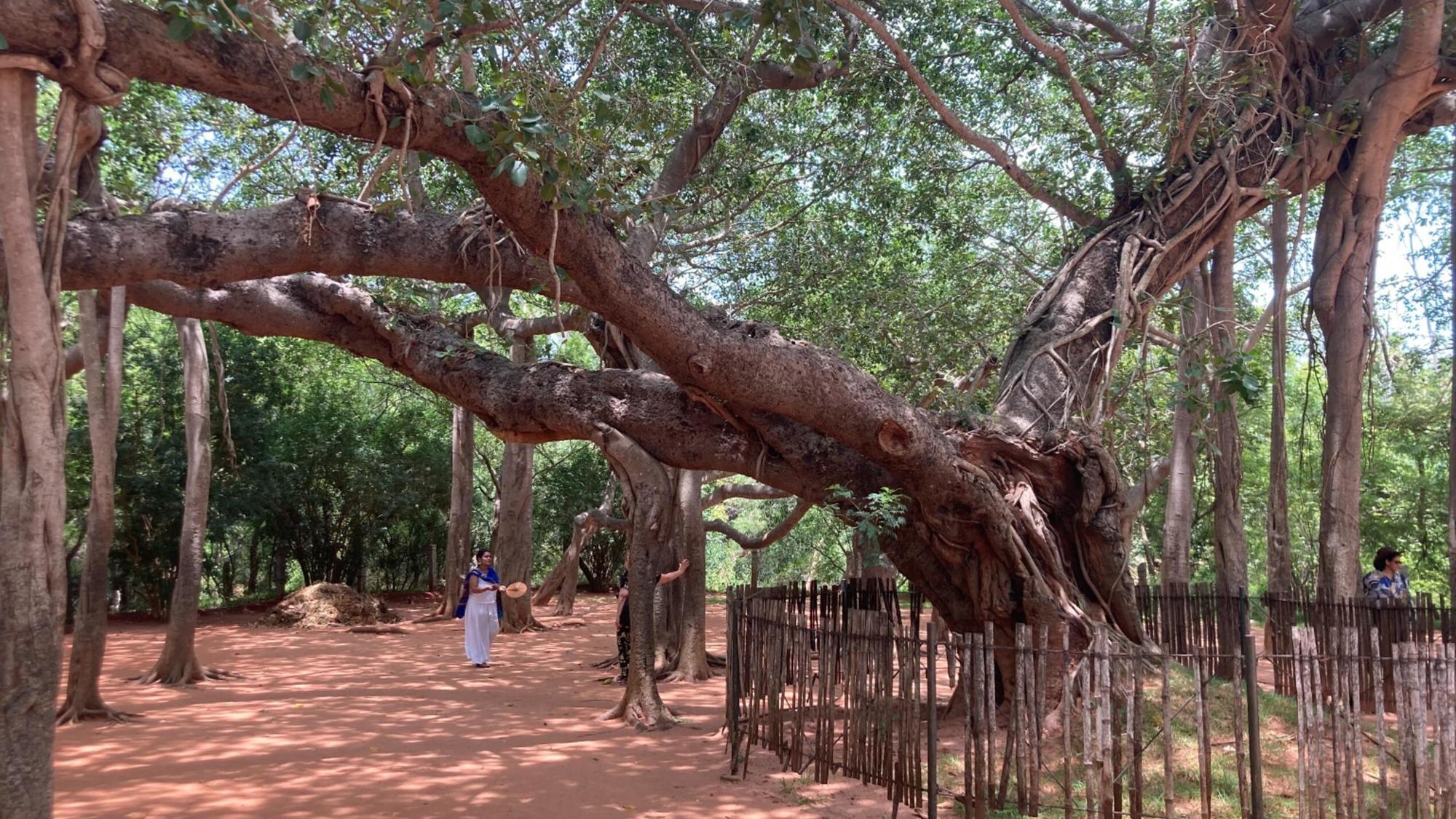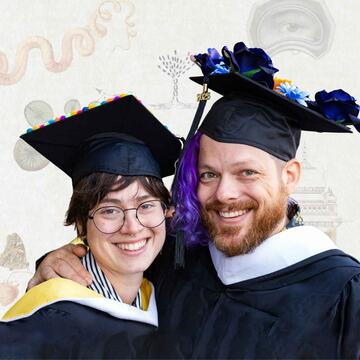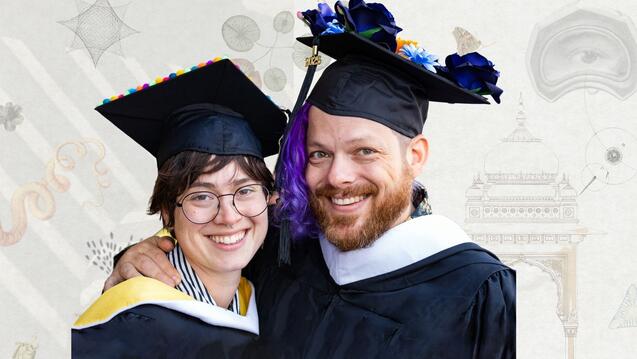
Master of Arts in Asian Contemplative and Transcultural Studies
Program Overview
Our Approach
CIIS’ two-year, online master's program in Asian Contemplative and Transcultural Studies teaches and researches the contemplative traditions, practices and experiences of South and East Asia as agents for change in the modern world. The program offers a field of study for scholar-practitioners interested in experiencing personal transformation and in becoming leaders who catalyze world transformation.
A reflective and practical engagement with the contemplative traditions, practices and experiences of Asia can play a significant role in restoring meaning and wholeness for modern populations as well as diasporic Asians seeking deep connections with their roots.
The study of these traditions in an academic environment aims to provide a safe, neutral and critically conscious space for learning, and inquiry distanced from ideological, political or cultic identities. Our program provides frameworks for comprehensive understanding and informed engagement while also offering historical and cultural context and depth absent in popular or sectarian approaches.
To further academic development in Asian contemplative studies, our department also offers scholarships specific for this program. Our program is structured using eight themes that interweave a multifaceted interdisciplinary approach to Asian studies. Coursework and student research incorporate a thorough exploration of the following subject areas: Contemplative Science, Contemplative Arts, Contemplative Wisdom, Contemplative Psychology, Contemplative Psychospiritual Practice, Contemplative Applications, Modern Asian Studies, and Transcultural Studies.

Career Paths
CIIS is known for being a pioneer in the field of Asian Contemplative and Transcultural Studies. Students of our program are offered the expertise and experience of our University’s 50-year history with the subject.
Graduates from our program go on to work as:
- Educators, researchers, and writers
- Counselors and mental health professionals
- Artists and museum curators
- Community planners and activists
- Cultural relation experts
Curriculum
The master’s in East-West Psychology with a concentration in Asian Contemplative and Transcultural Studies at CIIS is a two-year, online M.A. program consisting of 36 units.
The program curriculum consists of 23 units of required courses (core courses and required and directed electives) from the principal areas of the program in psycho-spiritual practice, including eastern, western, indigenous, contemporary participatory spirituality, and socially-engaged practices and service learning. The program also includes an additional 13 units of electives in areas of the student’s choice.
The concentration also offers a certificate in Yoga Studies. An appropriate combination of core and elective courses are required for receiving this certificate. It can also be taken separately from the degree concentration and applied as a stackable component to the degree if desired.
Additionally, the following scholarship is available specifically for students of this master's program: Michael and Gityjoon Hebel Scholarship.
Featured Courses
Introduction to Yoga Psychology (3 units) Yoga is a term with both a broad and general meaning and a narrower and specialized meaning in the country of its origin. The west has its history of reception of the term, which has colored its meanings. In this course, we will look at the broader understanding of yoga as a pervasive Indic cosmo-psychology and an occult anatomy with its archive of practices, cultural expressions and goals related to life-choices. Taking a historical approach, we will explore the roots of yoga practice in the Indus Valley, the cosmological and psychological maps of the Vedas and Upanishads, the occult world of deities and supernaturals, the psychology of ritual, soul and reincarnation, the constitution of human nature, the psychology of knowledge, moksha and samadhi, the Gita's synthesis, the will and its uses, bhakti or devotion, the Tantric system of kundalini and the chakras; siddhis or paranormal powers, and cultural expressions influenced by these understandings. Finally, we will consider attempts at integrating these structures and processes and the utilities of yoga psychology to (post-)human potential.
Chinese Mind-Body Healing Systems: An Interdisciplinary Approach (3 units)
This course adopts a cross-disciplinary approach — drawing on Chinese philosophy and cultural history,
traditional Chinese medicine, and medical anthropology — to the study of Chinese body-mind healing systems. We will study and analyze the basic concepts and theories of traditional Chinese medicine in its
philosophical and cultural context. The course will emphasize the following components:
- Comprehensive study of fundamental concepts and theories of traditional body-mind healing systems, i.e., Qi, yin yang, five phrases, acupuncture meridians, integrative Chinese and Western diet and nutrition;
- Basic pattern diagnostic skills and applying healing principles, food and diet recipes to restore balance and improve health.
- Increased awareness and critical assessment of conventional health regimens.
Transformative Themes in the Upanishads (3 units)
The Upanishads are the earliest proto-philosophical texts of India. Upanishad literally means to sit near and refers at once to close circles of initiates and a language use expressive of intimacy to the truth. Part of a vast oral tradition of yoga, these texts thus use language as a means of praxis, as much poetry as philosophy. They are primarily contemplative texts, developing a variety of means for approaching nondual experience. In this course, we will consider passages from the principal Upanishads with a view to understanding its transformative devices, their relation to yoga practice, and the goals they work towards.
-
Year 1 | Fall
EWP 6001 Introduction to East-West Psychology (2 units)
EWP 6000 Community Retreat (1 unit)
EWP 6043: Introduction to Yoga Psychology (3 units)
TSD 6641 Krishnamurti and Bohmian Dialogue and Inquiry (3 units)
Year 1 | Spring
EWP 6330 Knowledge Work and the Modern Academy (1 unit)
EWP 9106 Contemplative Traditions and Practices (3 units)
EWP 6466 Introduction to Chinese Philosophy and Psychology (3 units)
Year 1 | Summer
EWP 6114: Auroville: An Immersive Research Experience (3 units)
Year 2 | Fall
EWP 6034 Modernity, Colonialism and Transcultural Hermeneutics (3 units)
EWP 6124 Chan/Zen Buddhism in Life and Art (3 units)
PARA 7225: Yoga Sutra of Patanjali (3 Units)
Year 2 | Spring
EWP 6326 Chinese Body-Mind Healing Systems: An Interdisciplinary Approach (3 units)
EWP 6128 Integral Yoga Psychology (3 units)
EWP 6015 Integrative Seminar (1 unit)
Year 2 | Summer
EWP 6321 How to Cultivate Qi (Life Energy) (1 unit)
Entry Requirements
An undergraduate major in psychology is not required, but applicants should have a strong interest in psychology. Students with insufficient background in psychology may be required to take specific courses while in the program.
Successful candidates for admission into our M.A. programs typically have the following qualifications: a vision that is compatible with our program's mission; a path of personal and/or spiritual growth; sufficient maturity and stability to pursue independent inquiry; basic competence in communication and dialogical skills; demonstration of respect for a diversity of viewpoints; the ability to clearly articulate educational and professional goals; basic scholarly writing skills; and the capacity to identify a prospective specialization that is consistent with the program's mission and resources.
Required Application Materials
Your application is your opportunity to share who you are. To be considered essays and written responses must be your own authentic work.
Online Admissions Application: Begin the application process by submitting an online graduate application at the link below and submitting the nonrefundable $68 application fee payment.
Degree Requirement: An undergraduate degree (B.A., B.S., or the equivalent) from an accredited college or university.
Minimum GPA: A GPA of 3.0 or higher in previous coursework is required. However, a GPA below 3.0 does not automatically disqualify an applicant and CIIS will consider a prospective student whose GPA is between 2.0 and 3.0. These individuals are required to submit a GPA Statement and are encouraged to contact our Admissions Team to discuss their options.
Transcripts: Official transcripts from all accredited academic institutions attended where 7 or more credits have been earned. Transcripts may be sent digitally to materials@ciis.edu or mailed to CIIS in their official, sealed envelope. Transcripts from institutions outside the U.S. or Canada require a foreign credit evaluation through World Education Services (WES). CIIS will also accept foreign credential evaluations that are in a comprehensive course-by-course format from the current members of the National Association of Credential Evaluation Services (NACES).
Admissions Essay: A five-to-seven page (typed, double-spaced) essay that answers the following:
- What life experience, values, emotional/spiritual insights, and aspirations have led you to apply to East-West Psychology?
- What are your educational, personal, and professional goals and objectives?
Academic Writing Sample: A piece of original academic writing of 2,000–4,000 words (eight to ten pages typed, double-spaced) meant to demonstrate the ability to express ideas and evaluate and critique existing scholarship in a chosen area. A sample that uses outside sources must include proper citations.
Two Letters of Recommendation: Letters of recommendation will be accepted from academic advisors, professors, professional supervisors, or someone able to attest to your ability to undertake the work required for your program. Recommenders should use standard business format and include full contact information-name, email, phone number, and mailing address.
Candidate Selection
Successful candidates for admission into our M.A. program typically have the following qualifications: a vision that is compatible with our program's mission; a path of personal and/or spiritual growth; sufficient maturity and stability to pursue independent inquiry; basic competence in communication and dialogical skills; demonstration of respect for a diversity of viewpoints; the ability to clearly articulate educational and professional goals; basic scholarly writing skills; and the capacity to identify a prospective specialization that is consistent with the program's mission and resources.
Events and Info Sessions
An Online Overview with Jennifer Gruczelak and Ronda Sharp
A Faculty- and Counselor-Led Info Session with Cindy Shearer, Debashish Banerji, and Dennis Spears
Attend our online event on February 21.



Take the Next Step
For over 50 years, CIIS has been at the forefront of education that integrates rigorous science, innovative scholarship, and social justice. You will learn from faculty at the forefront of their fields, local artists and activists, and a community of peers as passionate and dedicated as you. There’s never been a better time to be here – let’s build a healthier and more equitable world.




